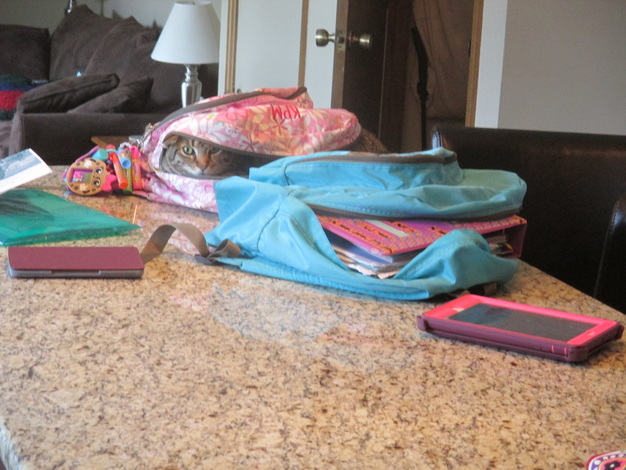|
If the axiom is that people can't be talked out of something they want to believe (see yesterday's post), then the corollary to the axiom is this: If you tell somebody something they disagree with they may argue with you, but if you tell them something that is outside of their perceived reality they won't hear you. At least not the first time you say it. Have you ever been unable to find your phone in your purse or backpack because you distinctly remember leaving it on your desk and it's not until you go back and tear your desk apart without finding it that you think, well, maybe you did toss it into your purse or pack so you go back and re-check your purse or pack and there it is?
Or am I the only one who ever does this? Anyway, the concept that people won't immediately see or hear something they don't expect to see or hear was tossed around in the movie "What The #$*! Do We Know?", which deals with how our reality is shaped by our perception (See post from 4/7/2014). To make this point the movie tells the story of how supposedly when Christopher Columbus' ships appeared far out on the horizon off the coast of America the natives, though they were looking right at them, at first didn't see the ships because they'd never seen or heard of ships before and so their brains had no idea of what to do with the images. Well, maybe or maybe not, I guess. But I can think of a couple of occasions when I've been unable to initially connect with an experience because I had no idea what I was experiencing (for one of them, again see post from 4/7/2014. For another of them see tomorrow's post). And I can think of a couple of occasions when I've witnessed others not connecting. One of these occasions took place just a few weeks ago. I was in the midst of teaching one of my students when their younger sibling came along and stood next to me, clearly wanting my attention. So I stopped the lesson and asked the child what was up. The child was bouncing with excitement to tell me that she'd just lost her first tooth and had put it under her pillow the night before. I congratulated her and asked how much a tooth brought in these days. "The fairy left $10!" she cried. I remarked that that was pretty good. The child agreed, and then went on to tell me that her friend from school had lost a tooth and the fairy left the friend only one dollar. But the little girl's friend had a second loose tooth so the little girl told her friend, " When your tooth comes out don't put it under your pillow, give it to me and I'll put it under mine and get you $10 for it!" After the little girl finished her story her older sibling shot me an Oh dear look then turned to the younger sibling and said, ever so gently, "You know, maybe the tooth fairy leaves the money under your pillow or maybe it's your mom and dad who leave it." I feared I was about to witness a painful pivotal moment of childhood revelation. But no, the little girl just prattled about how she told her friend to be sure and put the tooth in a plastic bag before bringing it to school. What her sibling told her simply did not compute. Thank goodness. I hope reality does not hit her hard.
2 Comments
Romaine
4/29/2015 06:46:09 am
Great story about the tooth fairy! I think we can only hear things when we are ready and that is why it takes so long sometimes. It is in line with that old saying "When the student is ready the teacher arrives"
Reply
Patti
4/29/2015 11:01:03 am
Yes, true!
Reply
Leave a Reply. |
"Tropical Depression"
by Patti Liszkay Buy it on Amazon: https://www.amazon.com/dp/B0BTPN7NYY "Equal And Opposite Reactions"
by Patti Liszkay Buy it on Amazon: http://amzn.to/2xvcgRa or from The Book Loft of German Village, Columbus, Ohio Or check it out at the Columbus Metropolitan Library
Archives
July 2024
I am a traveler just visiting this planet and reporting various and sundry observations,
hopefully of interest to my fellow travelers. Categories |







 RSS Feed
RSS Feed